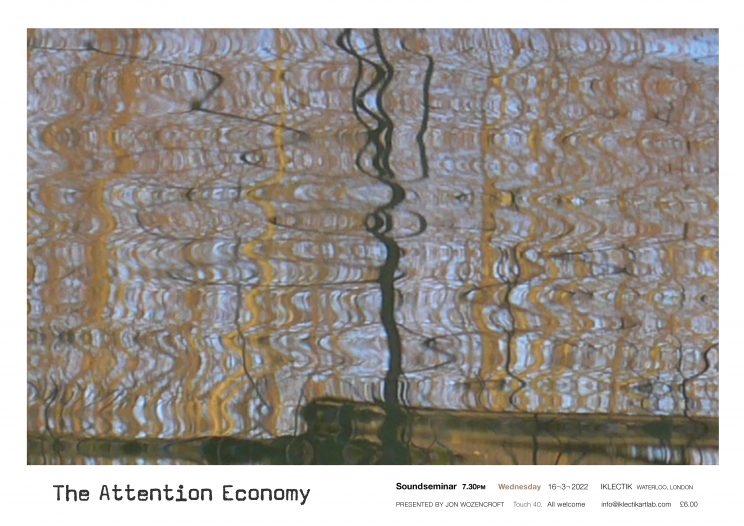
IKLECTIK presents,
JON WOZENCROFT SOUND SEMINAR: The Attention Economy
Wednesday 16 March 2022 | from 7:30pm
Tickets: £6 General Admission https://buytickets.at/iklectik/653627
The Attention Economy
To give your full attention to someone or something is an act of generosity
and love that is at the heart of dynamic communication, where listening is as
vital as speaking and quiet counsel as significant as sending. Attention,
however, is beset by the negative associations of one’s schooldays – “Pay
attention!” – and then its military context, “Stand to attention”, indicating its
close relationship to hierarchical barriers that simply foster boredom and
distraction and then apathy.
The attention economy was first theorized by the political scientist Herbert A.
Simon in 1971, sensing that the tendency towards information overload would
create a ‘rabbit in the headlights’ paralysis amongst the general public. “What
information consumes is rather obvious: it consumes the attention of its
recipients”, he wrote. “Attention transactions” would replace financial
transactions as the focus of our economic system, and especially in the
worlds of politics, advertising and social media, so it came to be.
Intangible factors became paramount to the processes of promotion and
distribution, namely immediacy, personalisation and free accessibility.
“Attention economics” forms a potential consumer’s attention as a resource –
advertisers follow a model they called AIDA – Attention, Interest, Desire and
Action. Attention is therefore the first stage in the process of converting non-
believers and non-consumers. There is no time to digest, only to react, or not.
Progressively this directive takes over all aspects of media communication,
bringing us to the current conditions of widespread disinformation and its
supposed remedy, the digital detox. If “ignorance is bliss”, in its latest guise,
ignorance becomes essential for maintaining a certain level of mental health.
Disinformation fosters conspiracy theories, anxiety, incredulity with the
dangerous outcome that nobody believes anything anymore, or could that be
the opposite?… Extremism emerges as the only way of attracting attention.
How this is reflected in music/culture is less clear cut. Between the necessary
hook of a pop song and the immersive spaces of drone music, Pauline
Oliveros’s advocacy of ‘deep listening’ is becoming ever more crucial in the
current climate.
Jon Wozencroft developed his sound seminars in the late 1980s as a means of highlighting the potential of sound-related research and practice in art and design education. Primarily, the seminars promote the art of listening and seek to rebalance the dominant bias of visual culture which favours the eye over the ear. Listening both enhances one’s perceptual awareness and creates an oasis away from 24/7 non-stop media. The seminars underline the power of sound and music as catalysts for change in a context in which recorded music has been progressively devalued in the digital environment. Drawing upon forty years of working in music publishing and performance, Wozencroft moves the audience between and beyond genre classifications and makes connections where past present and future come alive in the moment.


